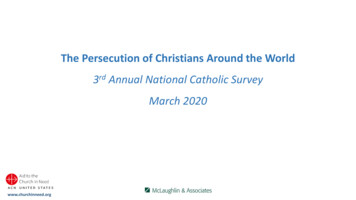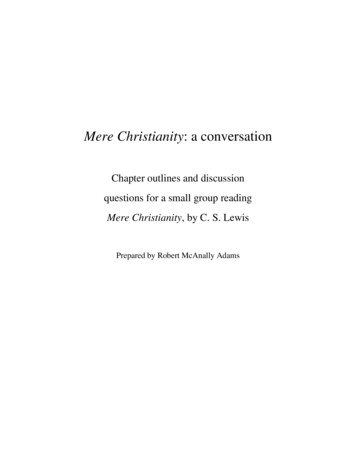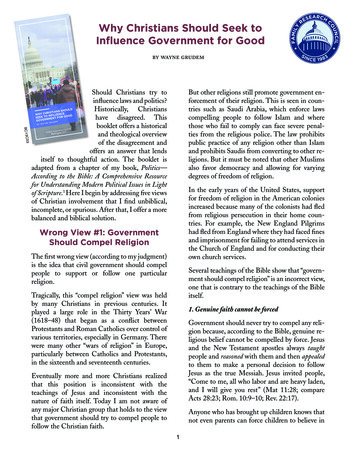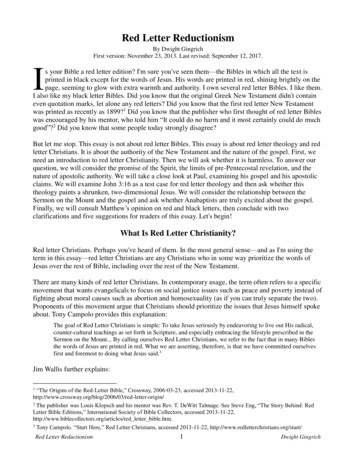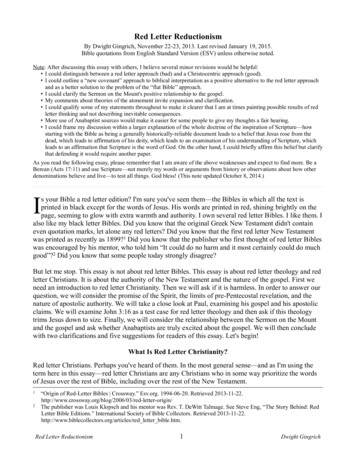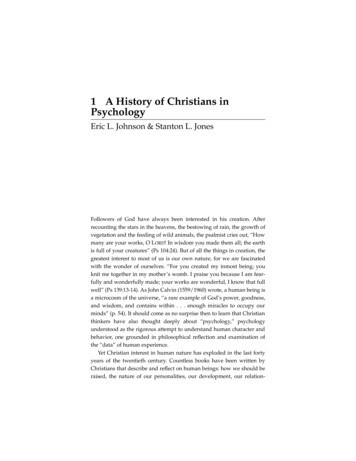
Transcription
Chap1.fm Page 11 Thursday, July 27, 2000 3:57 PM1 A History of Christians inPsychologyEric L. Johnson & Stanton L. JonesFollowers of God have always been interested in his creation. Afterrecounting the stars in the heavens, the bestowing of rain, the growth ofvegetation and the feeding of wild animals, the psalmist cries out, “Howmany are your works, O LORD! In wisdom you made them all; the earthis full of your creatures” (Ps 104:24). But of all the things in creation, thegreatest interest to most of us is our own nature, for we are fascinatedwith the wonder of ourselves. “For you created my inmost being; youknit me together in my mother ’s womb. I praise you because I am fearfully and wonderfully made; your works are wonderful, I know that fullwell” (Ps 139:13-14). As John Calvin (1559/1960) wrote, a human being isa microcosm of the universe, “a rare example of God’s power, goodness,and wisdom, and contains within . . . enough miracles to occupy ourminds” (p. 54). It should come as no surprise then to learn that Christianthinkers have also thought deeply about “psychology,” psychologyunderstood as the rigorous attempt to understand human character andbehavior, one grounded in philosophical reflection and examination ofthe “data” of human experience.Yet Christian interest in human nature has exploded in the last fortyyears of the twentieth century. Countless books have been written byChristians that describe and reflect on human beings: how we should beraised, the nature of our personalities, our development, our relation-
Chap1.fm Page 12 Thursday, July 27, 2000 3:57 PM12Psychology & Christianityships, our inner well-being, and on and on. However, this explosion ofinterest has resulted in a major controversy within the church. Why?Because over the past century a complex and rich body of knowledgeand practice has arisen that attempts to understand and treat human personality and behavior in ways which are usually disconnected fromChristian perspectives on life, and sometimes in ways that seem to contradict what Christians have regarded as biblically grounded truth abouthumanity. Disagreement is rampant about how much and in what waysthe theories and findings of this secular version of psychology shouldinfluence, be absorbed into, and even transform the way Christians thinkabout persons.Thus we are struggling as Christians with what seems like a newproblem: How do we relate or connect our cherished Christian beliefsabout persons to what this secular version of psychology tells us aboutthem? This is reminiscent of an old problem: For centuries Christiansthemselves have thought about human beings in different ways. Christians have disagreed, for example, on the nature of human free will—Wesleyan and Reformed Christians believe differently about God’sinvolvement in human actions. An even more complex problem is thefocus of this book. Christians disagree about how we should understandand relate to the enormous, impressive body of knowledge and set ofpractices that have developed in the twentieth century known today aspsychology, since it offers us a largely secular version of psychology. Thisbook presents four of the most important approaches contemporaryevangelicals use to relate their faith to the study and treatment of humannature (that is, psychology and counseling).Some Christians believe there are marvelous things to learn frommodern psychology, embracing psychological findings and theories withenthusiasm, while others approach secular psychology with great caution. There are even some who argue that any appropriation of secularpsychology is heresy, that secular psychology is a poison which taintsand infects all Christians who imbibe it. Think of a continuum: at oneend are atheistic thinkers who believe that all religions, including Christianity, are false and that psychology is the only source of reliable knowledge about humanity; for these people “religious knowledge” meansnothing and secular psychology means everything. At the other end of
Chap1.fm Page 13 Thursday, July 27, 2000 3:57 PMA History of Christians in Psychology13this continuum are Christians who might be called “fundamentalists,”who believe Christians should only affirm what is in the Bible and rejectany input from “worldly” sources, especially secular psychology; suchcritics go so far as to decry one-on-one counseling since it is not expresslytaught in the Bible (cf. Bobgan & Bobgan, 1997). This book will examineneither of these extremes but instead will look at what lies betweenthem—four constructive views of how Christians should understandpsychology and counseling.Before we learn about the four approaches themselves, let’s take sometime to trace the historical and intellectual background for the presentdebate.Faith, Science, and SecularismOver the past 150 years, revolutionary shifts have occurred in the fundamental ways we conduct our intellectual lives in the West. Though therewere notable exceptions, Europeans and Americans of the early 1800sbroadly agreed that Christianity provided the only legitimate view ofreality. Most Westerners—common folk and scholars alike—thoughtwithin the framework of a biblical worldview. They assumed that Godhad created the world, that human beings were specially created in hisimage, that human reason could apprehend ultimate truth because Godhad made them capable of knowing truth, that biblical morality was universally true and invariant, that the biblical virtues depicted what itmeant to be fully and perfectly human, and so forth.Of course, the West is still commonly considered Christian, and amajority of Europeans and Americans would still label themselves Christian if asked their religion. Two significant changes, however, haveoccurred. Among this group of avowed Christians there is a relativelysmaller percentage who would continue to hold to the traditional beliefsof classic Christianity and consistently practice their faith (perhaps 15 to20 percent in America, maybe 5 to 10 percent in Europe [higher in Italyand Poland, lower in France, England, and Germany]). In addition, overthe last 150 years an alternative worldview has competed for culturalinfluence, and over the course of this century it has become the dominantparadigm for understanding ourselves in Western culture, a worldviewnow called modernism.
Chap1.fm Page 14 Thursday, July 27, 2000 3:57 PM14Psychology & ChristianityA fuller description of modernism will be given below, but for nowlet’s focus on one feature of modernism: its secularism; that is, its tendency to empty culture of its religious significance, discourse, and symbols. Because of this feature, Christianity and modernism have struggledin the West for cultural dominance. In the main, most contemporaryWesterners have been shaped by both modernism and Christianity.However, the secularism that has pervaded the significant writings andmajor institutions of Western culture in the twentieth century is evidencethat modernism has superseded Christianity in influence. Most of theinfluential authors, thinkers, scientists, and celebrities of the twentiethcentury were not religious, or if they were, their religion was not visible.Many of the most influential shapers of modern culture openly disparaged traditional religious perspectives (e.g., Marx, Nietzsche, Freud, H. G.Wells, John Dewey, Bertrand Russell, Samuel Beckett, Jean-Paul Sartre,Michel Foucault, and Richard Rorty, to name a few). Perhaps the mostpowerful and tangible example of this movement is the way that European and American institutions of higher learning have so remarkablymoved from Judeo-Christian to secular sensibilities over the past 150years. Institution by institution, colleges and universities have shed theiroriginal commitments to glorifying Christ and proclaiming the Christiangospel to embrace a secularized definition of mission and identity (a process in America that has been documented by Burtchael, 1998; and Marsden, 1994). Gradually, beginning in the early twentieth century, unwritten rules developed that excluded religious views from expression in themain forms of media, education, and science in the West. As a result, religious speech was relegated to private life and to religious institutionsand media—churches, sectarian colleges, and religious broadcasting.Beyond that, with few exceptions religious considerations were droppedfrom public discourse.Of course, there were benefits to Western culture that resulted fromthese modern requirements: it made possible a common educational system; it allowed people with different faith commitments (Christian, Jewish, agnostic) to talk with, work with, and learn from each other; and itallowed people to concentrate on those beliefs that most people hold incommon rather than those that divide. However, in many ways the costof this secularization has proven very high.
Chap1.fm Page 15 Thursday, July 27, 2000 3:57 PMA History of Christians in Psychology15At the same time, this move away from a religious worldview to a secular one also happened to coincide with another very significant culturaldevelopment: the application of natural science methods to areas of theworld to which they had not been previously applied. Intense quantification and controlled observation had proven successful in previous centuries in astronomy, physics, chemistry, and biology. Now these methodsbegan to be applied to the study of society, human consciousness andbehavior, economics and business, and education with notable results.Secularism combined with the methods of the natural sciences in thestudy of human nature resulted in a number of sciences being newlyformed or reformed in ways that excluded reference to supernaturalbeliefs or assumptions. This mix of secularization and the application ofscientific methods to the understanding of animal and human behavior,emotion, personality, and thought shaped the modern version of psychology. And it is this combination which has led to the present debateamong Christians about how the findings and theories of secular psychology should relate to Christian belief and practice.The History of Western Psychology and Counseling Before 1879In thinking about how psychology and Christian faith should relatetoday, it is essential to recognize that the present state (one of tension anddebate) is similar to and yet different from the state of psychologythrough much of the history of the church. According to most contemporary introductory textbooks in psychology, psychopathology, and counseling (and even some history of psychology texts), the founding ofpsychology is believed to have occurred in the mid to late 1800s. Nevertheless, there was counseling, psychological theorizing, reflection, writing, and in some cases research prior to this time, even centuries prior(Brett, 1912; Diamond, 1974; Leahey, 1997; Robinson, 1981; Watson &Evans, 1991). Unquestionably, the form of this work was different inmany respects from twentieth-century psychology. Most importantly, itwas far less empirically and quantitatively oriented, and much more reliant on the philosophical reflections of individuals. Still, genuine insightsto psychological thinking can be found in pre-1879 texts, even if we mustacknowledge that in most cases such insights were developed with lesscomplexity than has been the case in the twentieth century.
Chap1.fm Page 16 Thursday, July 27, 2000 3:57 PM16Psychology & ChristianityPsychology in the West was first developed with unusual sophistication by Greek philosopher-therapists like Plato, Aristotle, and Epicurus.They attempted to describe human nature, including its fundamental illsand its reparation, on the basis of personal experience and rigorousreflection in light of prior thought (Nussbaum, 1994; Watson & Evans,1991). These thinkers explored topics like the composition and “inner”structure of human beings—memory, reason, sensation, appetite, motivation, virtues and vices, and various ideals of human maturation. TheOld and New Testaments themselves contain material of psychologicalimport (and in the case of Paul, perhaps a strongly religious protopsychology; Brett, 1912). However these reflections belong under the category of “folk psychology,” since they were not developed systematicallyfor the express aim of contributing to psychological knowledge. Nevertheless, within the classic Christian tradition, the Bible’s reflections onhuman nature have always been accorded a unique authority.After the New Testament era it seems the Bible and the psychologicalcontributions of Plato and Aristotle (and others) provided joint inspiration for and influence on the psychological theorizing of Christians forthe next fourteen hundred years. With only a limited grasp of the valueof actual empirical study, the major teachers and writers of the earlychurch and medieval periods were convinced that philosophical reflection grounded in Scripture provided the surest route to knowledge. Notsurprisingly then, the best psychological work by Christians was theresult of personal reflection, not research. Though largely concerned withmatters of faith and life, people like the desert fathers, Tertullian, Cassian, Gregory of Nyssa, and Gregory the Great wrote with sometimespenetrating insight into the nature of the soul and soul healing. However,it was Augustine, with his massive intellect, that provided the best example in the early church of psychological reflection (cf. Burnaby, 1938;Henry, 1960; Johnson, 1998; Wetzel, 1992). Steeped in the Scriptures andthe thought of the earlier church fathers, Augustine’s understanding wasalso influenced by the philosophical tradition inspired by Plato. Heworked out a system of thought fundamentally shaped by scriptural categories, but with a Platonic flavor. Nevertheless, his work on love, sin,grace, memory, mental illumination, wisdom, volition, and the experience of time provide a wealth of suggestions for psychology.
Chap1.fm Page 17 Thursday, July 27, 2000 3:57 PMA History of Christians in Psychology17Strongly influenced by Augustine but much more systematic (andtherefore more directly helpful for developing psychological theory) wasThomas Aquinas (cf. Brennan, 1937; Cantin, 1948; Cross, 1998). Significantly, this great Christian thinker devoted his life to relating faith to thethought of another brilliant but secular philosopher. Aquinas unified thebest of Augustinian and Aristotelian tradition and produced an influential body of psychological thought covering the appetites, the will, habits, the virtues and vices, the emotions, memory, and the intellect.It is worth underlining that the two greatest intellectual lights of thechurch’s first fifteen hundred years, Augustine and Aquinas, drewheavily in their theological and psychological work on the philosophicaltraditions of the two greatest (and non-Christian) Greek philosophers—Plato and Aristotle. And their distinct approaches contributed to genuinedifferences in thought (despite their shared faith). In a very real sense,then, the work of each of these two great Christian thinkers represents an“integration” of Christian and non-Christian thought, though Aquinaswas engaged in such integration much more self-consciously thanAugustine, who was more explicitly working out the differencesbetween Christian and pagan thought, between the “city of God” and the“city of humanity.”Other Christians of the Middle Ages who wrote on psychological topics, including Bonaventure, Bernard of Clairvaux, Symeon the NewTheologian, Anselm, Duns Scotus, and William of Ockham, typicallyfocused on concerns like the structure of the soul, knowledge, and spirituality and spiritual development. Through the early church and medieval periods, these and other writers also studied the improvement of thesoul. Pastoral care, counseling, and spiritual direction were of primaryimportance. Clearly, the healing of souls (and what we now call counseling) was central to the mission of the church long before modern psychotherapy came on the scene (Jones, 1985; McNeill, 1951; Oden, 1989;Stewart, 1998).The Renaissance, Reformation, and Counter-Reformation released anew curiosity in things natural, including topics that we now considerpsychology. For example, Catholics in the Counter-Reformation like Teresa of Avila and John of the Cross described spiritual development withunparalleled depth. Reformers like Luther and Calvin wrote only indi-
Chap1.fm Page 18 Thursday, July 27, 2000 3:57 PM18Psychology & Christianityrectly on psychology, but their reflections on sin, grace, knowledge, faith,and the nature of the Christian life contributed to the further development of a Protestant folk psychology largely shaped by biblical (andAugustinian) themes. However, similar to much of the work of earlierChristians, the main focus of this quasi-psychological writing was morepastoral: the cure and upbuilding of the Christian soul. In other words,their concern was most often directed toward the shaping of moral character and the enhancement or deepening of a believer ’s relationship withGod, sometimes directed toward what we call “therapeutic” concerns(such as the resolution of severe “melancholy,” seen as a normal part ofpastoral care) and not at all directed toward what we call “self-actualization” or the enhancement of human potential. In the Reformation traditions this pastoral psychology reached its zenith in the Puritan andPietist periods, when writers like Richard Baxter, John Owen, GeorgeHerbert, William Law, John Wesley, Jonathan Edwards, John Newton,and (later) Archibald Alexander developed sophisticated and nuancedunderstandings of the soul’s spiritual development in Christ, considerations that have major implications for pastoral care and Christian counseling today.In addition, Christian philosophers after the Middle Ages continuedto reason about human nature in ways that shed light on psychology,including such luminaries as René Descartes, Giovanni Vico, John Locke,Bishop George Berkeley, Thomas Reid, Bishop Joseph Butler, GottfriedLeibniz, and Blaise Pascal, some of whom are universally recognized asimportant figures leading up to the founding of modern psychology. Inthe Americas a number of Christians also contributed works in psychology (the best of which probably include Edwards, 1754/1957; 1746/1959;McCosh, 1886, 1887; Porter, 1869; though probably only Edwards hasmore than historical interest). Possibly the most significant Christian psychology author since the Middle Ages was Søren Kierkegaard, who considered himself a Christian psychologist and who contributed some ofthe most profound theoretical psychological works ever written from aChristian or non-Christian standpoint (e.g., 1844/1980a; 1848/1980b; cf.Evans, 1990). Over the course of a decade he described with brilliance (insometimes disturbing ways) the nature of personhood, sin, anxiety, theunconscious (before Freud was even born), subjectivity, human develop-
Chap1.fm Page 19 Thursday, July 27, 2000 3:57 PMA History of Christians in Psychology19ment, and spiritual development from a thoroughgoing Christian perspective. Kierkegaard is, as well, the only Christian thinker who can beconsidered a “father” to a major modern approach to psychological theory and therapy—existential psychology (though Kierkegaard wouldalmost certainly be horrified to be considered the founding father ofwhat is among the psychological approaches considered most alien andhostile to Christian faith; see Jones & Butman, 1991).So while a certain form of psychology and therapy originated in thelate 1800s, psychology (defined broadly as a disciplined, focused inquiryinto human nature) and counseling (defined as an attempt to heal thesoul and advance its well-being) have been practiced by Christians forcenturies. Christians contributed novel and significant psychologicalinsights in such areas as the nature of human reason, sensation, memory,attention, the appetites, the emotions, volition, and related subjects; theunconscious; the experience of time; moral, spiritual, and characterdevelopment; the role of God and grace in human development; thenature and impact of sin; techniques for overcoming sin and brokenness(the spiritual disciplines, as well as herbal remedies and common sensehelps); the psychology of religion; the relation of free will and determinism; biological versus environmental origins of psychological phenomena; body-soul relations; and some of the bases for scientific research(Brett, 1953; Robinson, 1981).However, at the same time there is no question that the degree of complexity and accuracy in our understanding of human nature and thedegree of rigor used in its investigation was with a few exceptions farbelow that of the twentieth century. The scientific revolution in the Westcontributed an amazing drive toward a detailed examination of phenomena unlike anything ever seen in history. Though the classical pastoralcare tradition may rival the work done on therapy in the twentieth century in certain respects, the sheer quantity of knowledge acquired inother psychological areas over the last one hundred years far outstripsthe knowledge accumulated over previous centuries. Moreover, the simple truth is that pure philosophical and theological reflection about concrete matters of human life not clearly addressed in Scripture andunchecked by empirical research inevitably yields error as well as truth.Understanding human nature would advance only as human nature
Chap1.fm Page 20 Thursday, July 27, 2000 3:57 PM20Psychology & Christianityitself became the object of careful scientific investigation. We turn next toconsider the Christian contribution to the scientific revolution.Christian Influence on the Development of Modern ScienceSecular thinkers and Christian fundamentalists often share a core conviction that we regard as substantially flawed: that “natural knowledge”(knowledge coming from sources other than the Bible, including scientific knowledge) is the enemy of faith. Admittedly, the church has longstruggled with this issue. Here, we will not take on the task of outlining ajustification for Christian engagement with “natural knowledge.” Wewill presume the reasonableness of learning from sources other than theScriptures.Many secularists, however, claim that a clear lesson is learned fromthe historical relationship of science and religion. For many, the Galileoaffair sums it all up: Religion has always stood for dogmatic certaintyand superstition in the service of authoritarian control, while science hasbeen on a noble quest for truth.1 The two forces—superstitious religionand scientific rationality—have been locked in conflict since the emergence of modern science. By outlining how this conviction is mistaken,we hope to lay a better foundation for understanding how Christians canapproach the scientific discipline of psychology.Today, many people accept the “warfare” model of the relationshipbetween science and religion. Several writers stand out in the last 150years as proponents of this metaphor. Thomas H. Huxley, the popularizer of Darwin’s thought (who was called “Darwin’s bulldog,” in hisday), worked tirelessly to wrest control of nineteenth-century Englishuniversities away from the Church of England. He did so by paintingChristianity as the enemy of the pursuit of knowledge. In one of his moreflamboyant moments he wrote, “Extinguished theologians lie about thecradle of every science, as the strangled snakes beside that of Hercules;1During the later years of the Inquisition, Galileo was threatened with imprisonmentand excommunication by authorities in the Catholic Church if he did not retract hisendorsement of a heliocentric planetary system, which was believed to contradictthe teachings of the Bible and the authoritative views of ancient writers that theearth was at the center and was immovable. He did in fact recant in 1633 (Shea,1986).
Chap1.fm Page 21 Thursday, July 27, 2000 3:57 PMA History of Christians in Psychology21and history records that whenever science and orthodoxy have beenfairly exposed, the latter have been forced to retire from the lists, bleeding and crushed; scotched if not slain” (Huxley, 1893, p. 52).John W. Draper, a chemist and physiologist, wrote the highly influential History of the Conflict Between Religion and Science (1874, which is stillin print today). It was essentially a diatribe against Roman Catholicism.Draper claimed that since its earliest years, the Roman Church had displayed “a bitter and mortal animosity” (p. 335) toward science thatresulted in the brutal persecution of scientists and other nonconformists.He described the Church’s hands as “steeped in blood” (p. 364). His revisionist history concluded that “Religion must relinquish that imperious,that domineering position which she has so long maintained against Science. There must be absolute freedom for thought. The ecclesiastic mustlearn to keep himself within the domain he has chosen, and cease to tyrannize over the philosopher [i.e., scientist], who, conscious of his ownstrength and the purity of his motives, will bear such interference nolonger” (p. 367).There is one small problem with such characterizations of the relationship between science and religion (particularly Christianity): they aretragic distortions of the truth. A summary of the many ways in which the“warfare” characterization is a distortion is beyond the scope of thisintroduction. All we can do here is highlight some crucial observationsfrom recent scholarship. For more complete discussion, see the work ofJohn H. Brooke (1991; see also Russell, 1985).First, defining and distinguishing either religion or science is a challenge, especially when we are looking back in history through twentyfirst-century eyes. Definitions of science and religion are profoundly complicated; both are dynamic and multifaceted human activities. Theboundaries of each are both blurred and moveable. The term science washistorically much broader than its use today. It was only since the midnineteenth century that science has become formally professionalized.Prior to this new era, scientists referred to themselves as “natural philosophers” and concerned themselves with many matters beyond what wewould today regard as the narrowly scientific. Isaac Newton, perhaps thegreatest scientific mind in history, seamlessly moved between interests inwhat we recognize as physics and chemistry, and interests in alchemy,
Chap1.fm Page 22 Thursday, July 27, 2000 3:57 PM22Psychology & Christianitybiblical prophecy, and theology. “Newton himself remarked that it waspart of the business of natural philosophy to discuss such questions asthe attributes of God and His relationship to the physical world”(Brooke, 1991, p. 7). Neither science nor religion is a static “thing.”“Because both are rooted in human concerns and human endeavor, itwould be a profound mistake to treat them as if they were entities inthemselves—as if they could be completely abstracted from their socialcontexts in which those concerns and endeavors took their distinctiveforms” (Brooke, 1991, p. 8). Each is connected to the other as well as topolitics (disciplinary and societal), culture, art, and daily life.Second, religion has played complex roles in the rise of modern science. On balance, Christianity did much more to facilitate the development of science than to impede it. Brooke (1991) argued that Christianityhas served or facilitated science in a number of ways, including the following three: It provided beliefs essential to the development of science that werenot present or important in other religions. For example, Christianitysuggested that we can expect uniformity in nature since one God createdand sustained the entire cosmos, that the sovereign Creator decreed thatthe material cosmos would behave according to “laws,” that human reason could understand the cosmos since our reason parallels that of itsCreator, and that the created order is a suitable object of study since it is acreated entity and not a part of God himself. Christianity provided personal motives for scientists, which includeimproving the world to bring glory to God and relieve suffering (notethat the strength of the prescribed motive to alleviate suffering variesmarkedly among different religious systems), being able to more fervently praise God by the activities of the mind (thus Kepler spoke of thescientist “thinking God’s thoughts after Him;” Brooke, 1991, p. 22), andthe possibility of science serving the causes of natural theology and apologetics (respectively, the tasks of proving God’s existence and attributesfrom study of the natural world, and the defense of faith against attacksby nonbelievers). Christianity “could reinforce prescriptions for an appropriate scientific method. Each science in its infancy has had to establish the assumptions and procedures by which it could claim to extend our knowledge of
Chap1.fm Page 23 Thursday, July 27, 2000 3:57 PMA History of Christians in Psychology23nature” (Brooke, 1991, p. 25). This foundation required justification beforethere was a substantial body of empirical product from the new science,and so justifications external to scientific inquiry itself had to be utilized.For example, “references to the freedom of the divine will were oftenused in the seventeenth century to justify attacks on rationalist theoriesof nature, whose authors presumed to know how God must have shapedthe world” (Brooke, 1991, p. 26) and thus justifying observation andexperimentation.A third observation that has been made from history is that the bestway to frame the evolving relationship of science and religion is not asone of “eternal conflict” but instead as a process of “gradual differentiation and divergence.” There are three broad views of the proper relationship of science and religion: (1) never ending conflict (Draper andWhite), (2) complementarity or i
The History of Western Psychology and Counseling Before 1879 In thinking about how psychology and Christian faith should relate today, it is essential to recognize that the present state (one of tension and debate) is similar to and yet different from the state of psychology through much of the history of the church. According to most contempo-
